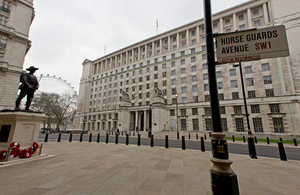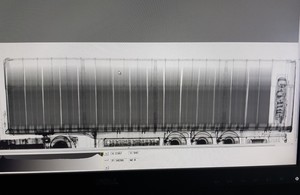EU Exit: Update on negotiations and the work of the Joint Committee
With your permission, Mr Speaker, I would like to update the House on the Government’s negotiations with the European Union on our future relationship, and the work of the UK-EU Joint Committee established under the Withdrawal Agreement.
First, the talks on a new trade agreement. We had hoped to conclude a Canada-style free trade agreement before the transition period ends on 31 December this year.
As things stand, that will not now happen.
We remain absolutely committed to securing a Canada-style FTA, but there needs to be a fundamental change in approach from the EU if the process is to get back on track. I have come to the House at the first available opportunity to explain why and how we have reached this point.
Mr Speaker, we have been clear since the summer that we saw the 15th of October – that is, last Thursday – as the target date for reaching an agreement with the EU.
The Prime Minister and the Commission President Ursula von der Leyen agreed on 3 October that our negotiating teams should work ‘intensively’ to bridge the remaining gaps between us. We made clear that we were willing to talk every day.
But I have to report to the House that this intensification was not forthcoming. The EU was only willing to conduct negotiations on fewer than half the days available, and would not engage on all the outstanding issues.
Moreover, the EU has refused to discuss legal texts in any area, as it has done since the summer. Indeed, it is almost incredible that we have reached this point in the negotiations without any common legal texts of any kind.
Then, on October 15, EU Heads of State and Government gathered for the European Council. The conclusions of that Council reaffirmed the EU’s original negotiating mandate, dropped a reference to ‘intensive’ talks that had been in the draft, and declared that all future moves in this negotiation had to be made by the UK.
Although some attempts were made to soften this message by some EU leaders, the President of the European Council reaffirmed those conclusions as authoritative on Friday.
This unfortunate sequence of events has in effect ended the trade negotiations, because it leaves no basis on which we can actually find agreement. There is no point in negotiations proceeding as long as the EU sticks with this position. Such talks would be meaningless and would take us no nearer to finding a workable solution.
Mr Speaker, that is the situation we face. That is why the Prime Minister had to make clear on October 16 that: The EU had refused to negotiate seriously for much of the last few months; The EU had now at the European Council explicitly ruled out a free trade agreement with us like the one it has with Canada; And therefore that this country should get ready for the 1st of January 2021 with arrangements that are more like Australia’s, based on simple principles of global free trade.
If the EU wants to change this situation, and I hope it will, it needs to make a fundamental change in its approach and make clear it has done so.
It has to be serious about talking intensively, on all issues, and trying to reach a conclusion.
But it also needs to accept that it is dealing with an independent and sovereign country. We have tried to be clear from the start that we would not be able to reach an agreement inconsistent with that status. I do not think, Mr Speaker, you could accuse us of keeping this a secret.
And yet the proposals the EU has discussed with us in recent weeks, which it presents as compromises, are simply not consistent with our new sovereign status. So Mr Speaker, while I do not doubt they are well intentioned, we cannot accept proposals that would require us to: Provide full permanent access to our fishing waters with quotas substantially unchanged to those imposed by EU membership; Operate a state aid system essentially the same as the EU’s, with great discretion given to the EU to retaliate against us if it thought we were deviating from it; And more broadly, stay in step with laws proposed and adopted by the EU across areas of critical national importance.
Mr Speaker, to repeat: we have been asking for no more than what has been offered in trade agreements to other global trading countries such as Canada – terms, moreover, which the EU said last year it had no difficulty offering to us.
We are not asking for special favours reflecting our 45 years as a member state. Quite the reverse. But if even this is impossible for the EU, then I must inform the House that we will be leaving on Australian-style terms and trading on the basis of WTO rules.
With just ten weeks left until the end of the transition period, that is not my preferred outcome. There will be some turbulence. But we have not come so far to falter now that we are so close to reclaiming our sovereignty: in control of our own borders and fishing grounds, setting our own laws, thriving as an independent, free trading nation and embracing the freedoms that will flow as a result.
It is therefore important, Mr Speaker, that I turn now to the preparations we are intensifying for the end of the transition period, whether we have a free trade agreement or otherwise.
I am in no way blithe or blasé about the challenges ahead, particularly given the additional challenges of dealing with the COVID-19 pandemic, but leaving the EU on Australian terms is an outcome for which we are increasingly well-prepared.
Ever since the UK decided it would leave the Single Market and the Customs Union at the end of the transition period, government and businesses alike have been working hard to prepare for the new customs procedures that were the inevitable result – that had to happen irrespective of any future relationship we struck with the EU.
I would like to congratulate businesses for the resourcefulness they have shown so far and urge them to continue responding as energetically, flexibly and imaginatively to the challenges of change – and also preparing for the opportunities ahead, including those stemming from our new free trade deals. The agreement with Japan struck by my Right Honourable Friend, the Secretary of State for International Trade, grants far more favourable access to the world’s third-biggest economy than we had as an EU member.
I would also like to put on record my particular thanks to the road haulage industry and customs intermediaries sector for their constructive engagement with Government, including at our round-table last week.
This week the Prime Minister and I will be speaking again to business leaders to discuss their preparations and plans for life outside the EU. We will continue to listen to their concerns, and redouble our efforts to help them adjust and prosper.
The ‘XO’ Cabinet Committee meets daily with an operational focus on business readiness. We continue to work closely with our partners in the devolved administrations to ensure every part of the UK is ready for the end of the transition period.
In these final ten weeks we are also intensifying our public information campaign. Every firm will find the information it needs on new import and export rules between Great Britain and the EU on gov.uk/transition, and HMRC is today writing to 200,000 traders that do business with the EU to reinforce understanding of the new customs and tax rules, and how to deal with them.
We are putting in place IT systems to help reduce the amount of change for flow across borders; we are giving businesses access to customs professionals to help with new ways of working; and we have planned how to fast-track vital goods in the first few weeks to get around EU bureaucracy.
To give traders extra clarity about the new rules, we have published and already updated our Border Operating Model; we have announced £705 million worth of investment in jobs, infrastructure and technology at the border; and we have strengthened our maritime security to protect our fishing fleets and safeguard our seas.
In addition, Mr Speaker, to the steps we are taking ourselves, we are also continuing our work with the EU in the Withdrawal Agreement Joint Committee – and I would like to update the House on its latest meeting which took place earlier this morning.
Coming only three weeks after the last meeting, I am pleased to report that in this forum, at least, the approach from the EU is very constructive. There is a clear imperative on both sides to find solutions and we remain committed to working collaboratively with the EU through the Joint Committee processes.
At our last meeting, in Brussels, I agreed with my co-chair, Vice President Maroš Šefčovič, that we would intensify discussions to implement the Withdrawal Agreement, primarily around citizens’ rights and the Northern Ireland Protocol.
Our officials have since held numerous sessions, including two Specialised Committees.
Today in London, I reiterated the UK’s commitment to upholding all our obligations under the Withdrawal Agreement and protecting the Belfast (Good Friday) Agreement in every respect.
We agreed that we will publish a joint update on citizens’ rights in the UK and EU, and I am pleased to confirm that almost four million EU citizens in the UK have now received status under our scheme.
We also discussed our work to implement the Northern Ireland Protocol. The UK outlined the steps we are taking to implement new agri-food arrangements. We acknowledged the EU’s concerns about appropriate monitoring of implementation, and have a better understanding of their requests and the reasoning behind them. We confirmed that the Specialised Committee on Other Separation Provisions would meet this month, and took note of good progress discussing Gibraltar and Sovereign Base issues.
While much remains to be resolved before the end of December, we have made substantial progress on implementation. Both sides are committed to an accelerated tempo of discussions via the Specialised Committees. I look forward to further pragmatic engagement with the Vice President in the weeks ahead, and want to put on record my appreciation for the constructive tone and spirit with which he and his team have approached our discussions.
Mr Speaker, in his statement on Friday the Prime Minister looked ahead to 2021 as a year of recovery and renewal, when this government will be focused on tackling COVID-19 and building back better. We are getting ready to do what the British people asked of us — to forge our own path, and not acquiesce to anyone else’s agenda.
On the negotiations, our door is not closed. It remains ajar, and I very much hope that the EU will fundamentally change its position. But come what may, we will take back control. And so Mr Speaker: four and a half years since the referendum, and with the finishing line now in sight, I commend this statement to the House.


